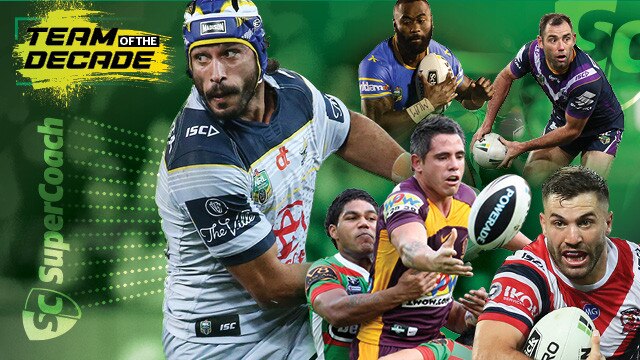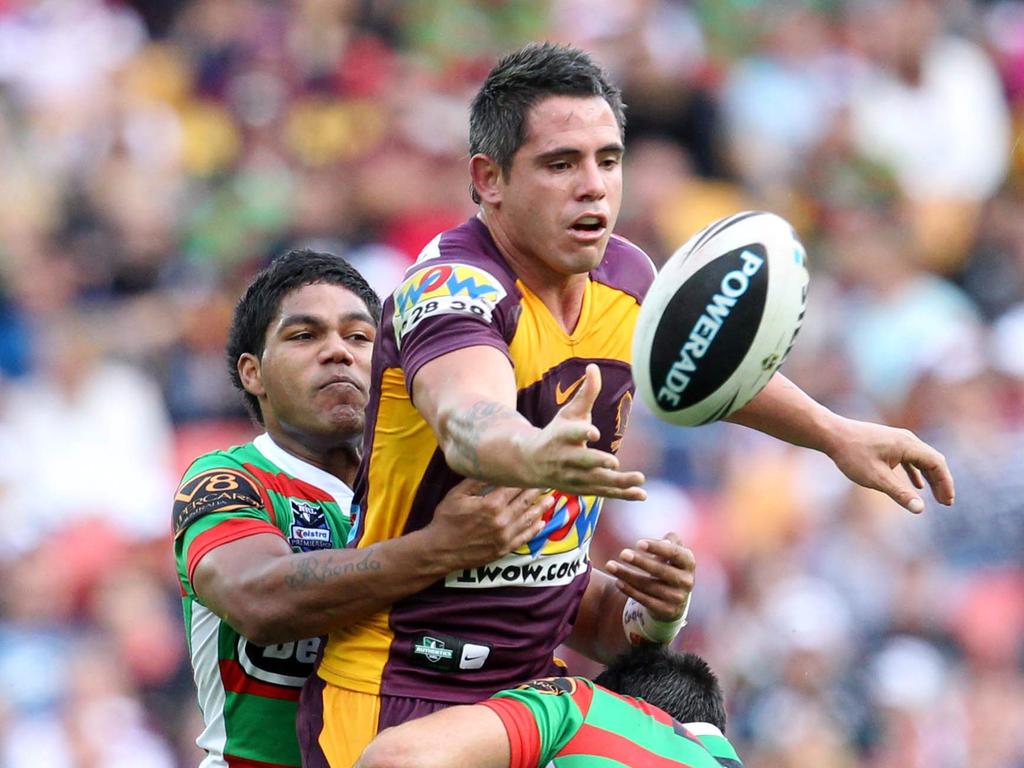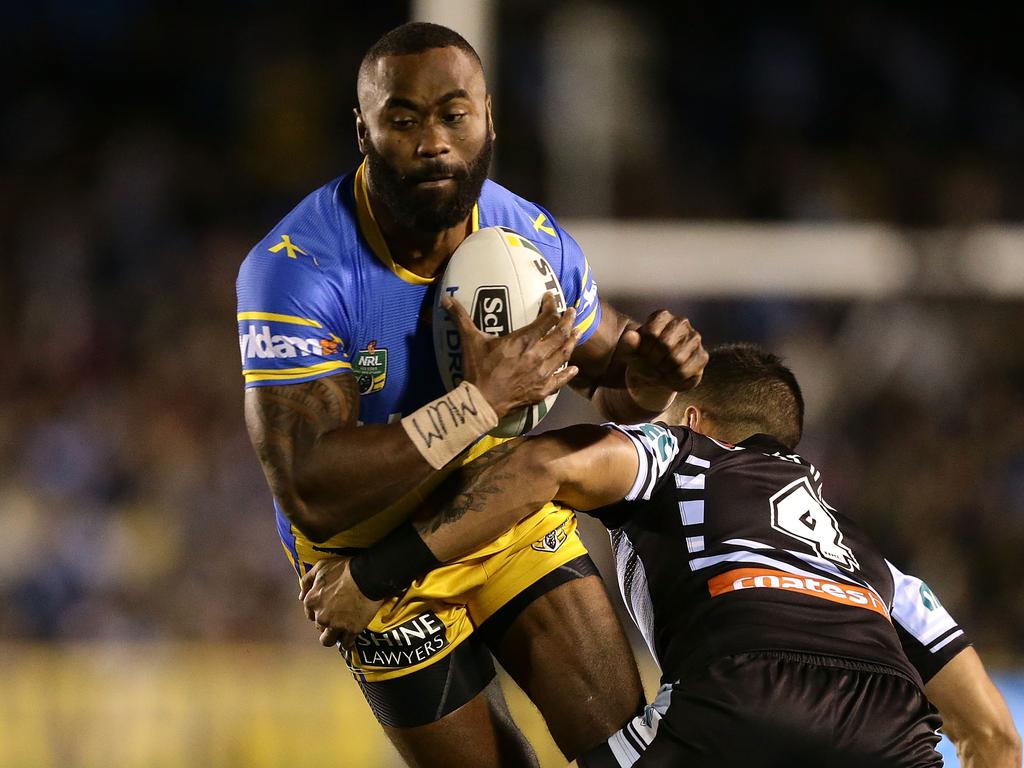The NRL SuperCoach Team of the Decade revealed
Take a trip down memory lane with Rob Sutherland as he delves deep into the SuperCoach NRL stats database to reveal the Team of the Decade.
SuperCoach
Don't miss out on the headlines from SuperCoach. Followed categories will be added to My News.
With 2020 firmly on the horizon it has become de rigeur among my fellow sports journalists to produce teams of the decade.
I loves me a bandwagon (Roosters fan) and so have turned my attention to selecting the SuperCoach NRL Team of the Decade.
Some selections were easy, some not so much, but in every case I have tried to be guided by the stats and not sentiment. If you think I got it wrong - or less likely right - let me know in the comments section below or hit me up on Twitter here.
Stream over 50 sports Live & On-Demand with KAYO SPORTS on your TV, computer, mobile or tablet. Just $25/month, no lock-in contract. Get your 14-day free trial and start streaming instantly >

* A brief note on my methodology - I have selected players in the position in which they actually play/played in the NRL. This means true backrowers like John Bateman and Simon Mannering could not make the team in the centres despite being eligible there in SuperCoach at times. Similarly, Greg Inglis played the overwhelming majority of his games at fullback so no CTW for him, Corey Parker and Paul Gallen are backrowers not front rowers so that’s where I have placed them.
HOOKER
Cameron Smith: 220 games, 16,029 points, 72.9 average
There was never any debate about this selection was there? Issac Luke was tremendous through 2010-2013 (averaging 67.8 points per game (PPG) over the four seasons). Robbie Farah was the best hooker in SuperCoach from 2009 (outside our time period I know) through to 2011 with an average of 70PPG over the three seasons. And Damien Cook (whose career average is significantly reduced thanks to his period as an understudy) has the most points and best average for any hooker over the past two seasons. But when Cameron Smith was not the best hooker in the game, he was second. That’s the worst position the Storm stalwart has ever finished. Smith’s ten year season averages read: 62, 77, 76, 83, 71, 69, 78, 75, 64 and 74 PPG and he has never played fewer than 20 games per season over the decade. Simply the best.
Honourable mentions:
Robbie Farah: 182 games, 11,100 points, 61 average
Issac Luke: 204 games, 12,243, 60 average
Damien Cook: 92 games, 5,457 points, 59.3 average
FRONT ROW
Andrew Fifita: 195 games, 12,402 points, 63.6 average
Aiden Tolman: 213 games, 12,495 points, 58.7 average
Andrew Fifita has posted the best score of any true front row forward over the past decade (1846 points in 23 games in 2013) and since 2013 he has averaged 70PPG. Much maligned in some quarters for a perceived poor attitude and application, what he lacks in base stat production Fifita more than makes up for with his prodigious offload game and tackle busts and he was the only true standout in this position. The other FRF to make the team is in some ways the antithesis of Fifita. Stalwart Aiden Tolman is the personification of a base stat monster regularly pumping out huge numbers of tackles in huge minutes (he averaged over 60 minutes per game 2014-2016). James Graham and Jesse Bromwich were both the best player at their position at some point in the decade, something Tolman never was, and on that basis both have strong claims but in the end it was Tolman’s sheer number of points that led me to preference him over them.
Honourable mentions:
James Graham: 167 games, 9,565 points, 57.3 average
Jesse Bromwich: 207 games, 11,182 points, 54 average

SECOND ROW
Corey Parker: 144 games, 11,936 points, 82.9 average
Paul Gallen: 180 games, 13,737 points, 76.3 average
Sam Burgess: 169 games, 11,709 points, 69.3 average
Between the two of them Paul Gallen and Corey Parker boast six of the top ten season averages (minimum 10 games) of the decade. Parker was a goalkicking lock (he slotted 586 from 808 attempts in his career) with a big defensive motor who was also an offload machine. Nicknamed ‘God’ by his legion of SuperCoach fans he is the best player the game has ever seen. Not too far behind Parker in the pecking order is Paul ‘PG13’ Gallen. Regularly averaging 75+ minutes per game with a PPM in excess of 1.15, Gallen’s love of a hit-up and an offload saw him crack triple figures with phenomenal regularity. The last starting role at this position was tough, but in the end it was the man with the greatest single season score in the history of the game, Sam Burgess, that gets the nod. In 2014, Burgess played 23 games busting seven triple figure scores (season high of 142) with three 90s to boot. Playing the game with no self regard took it’s toll over the latter part of the decade and were it not for injuries and a sabbatical to play rugby union when at his peak, he no doubt would have retired with a career average in excess of 70PPG. The honourable mentions feature a host of greats of the game and none more so than Nathan Hindmarsh. Sure ‘Hindy’ benefited from playing at a time when third man flop tackles earned you a point, but it’s hard to knock a man who features three times in the top 20 season scores at his position - despite playing just three seasons this decade. Sonny Bill Williams is arguably the greatest offloader in the history of the game, Jason Taumalolo is a monster, Jake Trbojevic and Simon Mannering are and were workrate personified. Every single one could have made the team.
Honourable mentions:
Jake Trbojevic: 116 games, 7,425 points, 64 average
Jason Taumalolo: 163 games, 9,749 points, 59.8 average
Nathan Hindmarsh: 70 games, 5,137 points, 73.4 average
Sonny Bill Williams: 39 games, 2,811 points, 72.1 average
Simon Mannering: 195 games, 11,771 points, 60.4 average
HALFBACK
Shaun Johnson: 174 games, 10,899 points, 62.6 average
When he’s good he’s electrifying, and when he’s bad he still scores pretty well, Shaun Johnson is a deserved halfback in this team. Johnson did not kick goals in his first two seasons, and if you take those years out of his figures he boasts a 67PPG average across the decade. Even leaving his formative years in, Johnson’s body of work lifts him above young Penrith gun Nathan Cleary. Should he stay injury free I have little doubt Cleary will own the position in the decade to come, but the extra 100 games and 6,000 odd points that Johnson has played/scored cannot be ignored.
Honourable mention:
Nathan Cleary: 73 games, 4,891 /points, 67 average
FIVE-EIGHTH
Johnathan Thurston: 173 games, 11,720 points, 67.7 average
A general in attack, Johnathan Thurston averaged better than a try assist and linebreak assist per game across the majority of his career and thanks to his trusty right boot (he kicked 923 conversions from 1161 attempts at a 79.5% strike rate) he had a ‘base’ score of 50+. A great of any era, JT was without peer in this decade. It would be remiss to not mention Anthony Milford and I’ll make it an honourable one. Not a ‘true’ half (Milford has played close to 30% of his NRL games at fullback), he is nonetheless is a matchwinner on his day and from 2014-2017 he averaged 66PPG.
Honourable mention:
Anthony Milford: 157 games, 9,657 points, 61.5 average

CENTRE/WING
Semi Radradra: 92 games, 5,655 points, 61.5 average
Jarrod Croker: 227 games, 12,543 points, 55.3 average
Jamie Lyon: 146 games, 8,330 points, 57.1 average
Latrell Mitchell: 89 games, 5,130 points, 57.6 average
Novice SuperCoachces may hear veterans talk wistfully of the ‘Semi Trailer’ and the fact Radradra is the only player on to make the team at this position without kicking goals (okay he kicked one in 2016 but that was a novelty effort) is a testament to his greatness. In 94 NRL games, Radradra scored 82 tries and in 2017 he busted the 150 point barrier in a single game twice. Jarrod Croker is the iron horse of the squad with the Canberra skipper playing more games than any other player on the team. He may have a slightly lower career average than a couple of players who did not make the team he makes it for me on shear weight of numbers. Jamie Lyon did play some five-eigth but the vast majority of his games were at centre and while he was not a sensationally accurate kick (he slotted 531 goals from 719 attempts at 73.8%) the points from goals and his solid base made him a stalwart in many a team through the first half of the decade. The last slot here goes saw me weighing up the relative merits of Jordan Rapana and Latrell Mitchell. In the end, Mitchell’s consistency across four seasons won over Rapana’s two huge seasons (1567 points at 65PPG in 2016 and 1635 points at 71PPG in 2017) though I’m not massively opposed to those who favour Rapana.
Honourable mentions:
Jordan Rapana: 107 games, 6,075 points, 56.8 average
David Nofoaluma: 119 games, 6,699 points, 56.3 average
Will Chambers: 155 games, 7,878 points, 50.8 average
Jason Nightingale: 202 games, 10,100 points, 50 average
Blake Ferguson: 179 games, 8,781 points, 49 average
Joseph Leilua: 192 games, 9,510 points, 49.5 average
FULLBACK
James Tedesco: 133 games, 9,137 points, 68.7 average
Going into this article I anticipated that his position would be the hardest to pick and I was wrong. For as good as Tom Trbojevic has been, James Tedesco has been his equal and ‘Teddy’ has almost 50 more games on his resume than ‘Turbo’ does. Truth be told both are superstars, but Teddy is more durable and if I can have just one it’s him. The honourable mentions are littered with quality, Roger Tuivasa-Sheck has the highest season score of any fullback (1858 at 77PPG in 2015), Billy Slater is a future immortal, were his 2015 and 2016 seasons not cut so short by injury he may have demanded the starting spot with sheer weight of stats. Jarryd Hayne’s 2014 season is a thing of SuperCoach legend - then he went to try his luck at NFL ruining any chance he had of making this team. And Michael Gordon I included because 10,000 points is huge and if he had retained goalkicking duties throughout the decade (he has a career 81% strike rate) that could have been 11,000.
Honourable mentions:
Tom Trbojevic: 88 games, 6,137 points, 69.7 average
Billy Slater: 141 games, 9,001 points, 63.8 average
Jarryd Hayne: 128 games, 7,901 points, 61.7 average
Roger Tuivasa-Sheck: 150 games, 9,046 points, 60.3 average
Greg Inglis: 154 games, 8,704 points, 56.5 average
Michael Gordon: 186 games, 10,001 points, 53.8 average

